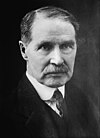English politician (1868–1951)
| Sir Anderson Montague-BarlowBt KBE | |
|---|---|
 | |
| Member of Parliament for Salford South | |
| In office 1910–1923 | |
| Preceded by | Hilaire Belloc |
| Succeeded by | Joseph Toole |
| Minister of Labour of the United Kingdom | |
| In office 1922–1924 | |
| Preceded by | Thomas Macnamara |
| Succeeded by | Tom Shaw |
| Baronet of Westminster | |
| In office 1924–1951 | |
| Preceded by | New position |
| Succeeded by | Position dissolved |
| Personal details | |
| Born | 28 February 1868 St Bartholomew's Vicarage, Clifton, Gloucestershire, England |
| Died | 31 May 1951 (aged 83) |
Sir Clement Anderson Montague-Barlow, 1st Baronet, KBE (28 February 1868 – 31 May 1951) was an English barrister and Conservative Party politician.
Life
Montague-Barlow was born Clement Anderson Barlow at St Bartholomew's Vicarage, Clifton, Gloucestershire, and preferred to be known under his second name, Anderson, rather than his first, Clement. He received a Master's degree and an LL.D. from the University of Cambridge and practised at the bar. Between 1910 and 1923 he represented Salford South in the House of Commons. In 1922 he was admitted to the Privy Council upon becoming Minister of Labour, a position he served in until 1924. He was made a Knight Commander of the Most Excellent Order of the British Empire in 1918 and in 1924 he was created a baronet, of Westminster in the County of London.
In 1938, Neville Chamberlain's government asked Barlow to chair a royal commission into the urban concentration of population and industry, "The Royal Commission on the Distribution of the Industrial Population", which became known as the Barlow Commission. Its report, published in 1940, raised the problem of large towns as a public issue for the first time, and concluded that "planned decentralisation" was favourable. The report was largely ignored at the time, as it came shortly after the outbreak of the Second World War, but its conclusions were a major factor behind the new towns movement after the war, which led to the creation of 27 new towns.
In 1946 Barlow changed his last name to Montague-Barlow.
Montague-Barlow died in May 1951, aged 83, when the baronetcy became extinct.
See also
References
- The National Archives: Royal Commission on the Distribution of the Industrial Population (Barlow Commission): Minutes and Papers Linked 2015-05-30
- Hansard 1803–2005, Mr Anderson Barlow. Alternative names: Anderson Montague-Barlow 1946 – 1951 Linked 2015-05-30
- Cameron Hazlehurst; Sally Whitehead; Christine Woodland (1996). A Guide to the Papers of British Cabinet Ministers 1900–1964. Cambridge University Press. p. 45. ISBN 978-0-521-58743-3.
External links
- Hansard 1803–2005: contributions in Parliament by Mr Anderson Barlow
- Royal Commission on the Distribution of the Industrial Population (Barlow Commission).
- Leigh Rayment's list of baronets
- Leigh Rayment's Historical List of MPs
| Parliament of the United Kingdom | ||
|---|---|---|
| Preceded byHilaire Belloc | Member of Parliament for Salford South December 1910–1923 |
Succeeded byJoseph Toole |
| Political offices | ||
| Preceded byThomas McNamara | Minister of Labour 1922–1924 |
Succeeded byTom Shaw |
| Baronetage of the United Kingdom | ||
| New creation | Baronet (of Westminster) 1924–1951 |
Extinct |
This article about a Conservative Member of the Parliament of the United Kingdom representing an English constituency and born in the 1860s is a stub. You can help Misplaced Pages by expanding it. |
- 1868 births
- 1951 deaths
- Conservative Party (UK) MPs for English constituencies
- Baronets in the Baronetage of the United Kingdom
- Knights Commander of the Order of the British Empire
- Members of the Privy Council of the United Kingdom
- UK MPs 1910–1918
- UK MPs 1918–1922
- UK MPs 1922–1923
- Members of London County Council
- Municipal Reform Party politicians
- Members of the Parliament of the United Kingdom for Salford South
- Conservative MP for England, 1860s birth stubs
